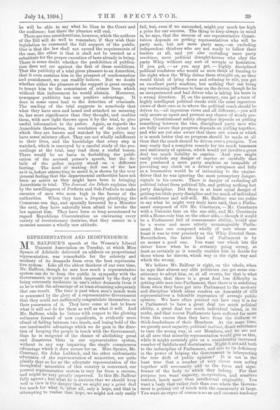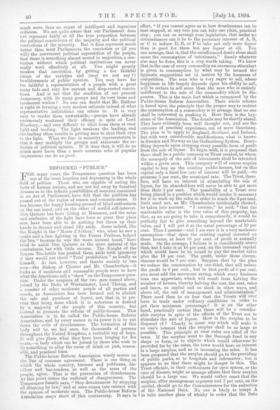REPRESENTATION AND INDEPENDENCE.
MR. BALFOUR'S speech at the Women's Liberal Unionist Association on Tuesday, at which Miss Spence of Adelaide delivered an address on proportional representation, was remarkable for the sobriety and modesty of its demands from even the best representa- tive system. Like all the ablest thinkers of our own time, Mr. Balfour, though he sees how much a representative system can do to keep the public in sympathy with the Government, is quite as much impressed by the duty of being extremely moderate in one's other demands from it as he is with the advantage of at least obtaining adequately that one result. The time is past when men's minds were so possessed by the glory of a representative Government that they could not sufficiently congratulate themselves on their possession of it. They have come at last to know what it will not do for them as well as what it will. And Mr. Balfour, while he listens with respect to the glowing estimates formed of new expedients, is evidently more afraid of falling between two stools, and losing hold of the one inestimable advantage which we do gain in the direc- tion of keeping the people in touch with the Government, than he is sanguine of the chance of abolishing great and disastrous blots in our representative system, without in any way impairing the single conspicuous advantage which it does secure for us. Miss Spence, Mr. Courtney, Sir John Lubbock, and the other enthusiastic advocates of the representation of minorities, see quite plainly that so far as the adequate representation of the thoughtful minorities of this country is concerned, our present representative system is very far from a success, and might be very greaily improved. In this Mr. Balfour fullyagrFes k but what he is anxious that we should keep i well n view is the danger that we might pay a great deal too much for what is, after all, only a hope, and that in attempting to realise that hope, we might not only easily fail, but, even if we succeeded, might pay much too high a price for our success. The thing to keep always in mind is, he says, that the success of our representative Consti- tution depends on getting representatives who will be party men, but not mere party men,—on excluding independent thinkers who are not ready to follow their leaders at all, and yet also excluding mere party machines, mere political draught-horses who obey the party Whip without any sort of scruple or hesitation. If you get, — as you may get, — highly disciplined political roadsters who would as soon think of turning to the right when the Whip drives them straight on, as they would think of lying down. and refusing to stir, you get an excellent party machine, but nothing that can bring any restraining influence to bear on the driver, though he be an. inexperienced and bad driver who is taking his team in a wrong direction. If, on the contrary, you get a team of highly intelligent political steeds with the most ingenious views of their own as to where the political coach should be driven to,—all ingenious views and all different,—you will only secure an upset and prevent any chance of steady pro- gress. Constitutional safety altogether depends on getting something between the two, disciplined party men who are fully aware that progress depends on pulling together, and who are yet also aware that there are crises in which it is much better that no progress should be made at all than that the coach should be driven over a precipice. You may easily find a complete remedy for too much tameness and uniformity of opinion, which would yet involve a great deal too much liability to caprice. And you might easily exclude any danger of caprice so carefully that you produced a mere party machine as incapable of providing any check on a driver's arrogance and folly as a locomotive would be of intimating to the engine- driver that he was ignoring the most peremptory danger- signals in his course. There is danger of excluding all political talent from political life, and getting nothing but party discipline. But there is at least equal danger of getting too little party discipline and too much of individual self-confidence and self-will. Mr. Balfour was too polite to say what he might very truly have said, that a Parlia- ment composed of 670 Mr. Courtneys, — Mr. Courtneys with a Unionist bias on the one side, and Mr. Courtneys with a Home-rule bias on the other side,—though it would be a Parliament full of consummate ability, would also be a worse and more utterly unmanageable Parlia- ment than one composed wholly of men whose one boast it was to vote precisely as the Whip directed them. Nevertheless, the latter kind of Parliament is by no means a good one. You want one which lets the driver know when he is certainly going wrong, at least as certainly as it usually enables him to decide for those whom he directs, which way is the right way and which the wrong.
We believe Mr. Balfour is right, on the whole, when he says that almost any able politician can get some con- stituency to adopt him, or, at all events, for that is what he means, that there is a great deal less difficulty in getting able men into Parliament, than there is in subduing them when they have got into Parliament to the modesty and discipline which alone renders an Assembly of 670. representatives a tolerable expression of average public opinion. We have often pointed out how easy it is for a Parliament to have a great deal too much political ability, a great deal too much individual talent, in its ranks, and that recent Parliaments have suffered far more from this excess than they have from the dullness or thick-headedness of their Members. At the same time, we greatly need sagacity, political instinct, dumb reluctance to turn the wrong way, in our Members, and Nye are not at all sure that minority representation would give us this, while it might certainly give us a considerably increased. number of faddists and doctrinaires. Might it not add both to the indiscipline of Parliament, and also to its deficiency in the power of helping the Government in interpreting the true drift of public opinion ? It is not in the least true that a number of very clever men acting together will necessarily add to the force and signi- ficance of the body to which they belong. For that purpose you want sagacity, co-operation, and sensitive instinct, much more than intellectual originality. You want a body that rather feels than sees where the Govern- ment is getting out of touch with the .community at large. You want an organ of conimcn sei se and common tendency much more than an organ of intelligent and ingenious criticism. We are quite aware that our Parliament does not represent fairly at all the true proportion between the political convictions of the 'majority and the political convictions of the minority. But it does represent much better than most Parliaments, the conviction or (if you will) the convenient political superstition of the people, that there is something almost sacred in majorities, a con- viction without which political institutions can never really work effectively at all. You might greatly weaken that conviction by getting a too faithful image of the varieties and (may we not say ?) bewilderments of public opinion. You may have far too faithful a representation of a people with a, great many fads and very few earnest and deep-rooted convic- tions. And is not that the condition of our present democracy, with its many groups and its very loose and incoherent wishes ? No one can doubt that Mr. Balfour is right in forming a very modest estimate indeed of what representative institutions can attain to. It is very easy to render them unworkable,—groups have already enormously weakened their efficacy in spite of Lord Rosebery,—and very difficult to elicit from them at once light and. leading. The light weakens the leading, and the leading often results in getting men to shut their eyes to the light. What we fear in minority representation is that it may multiply the groups and attenuate the co- hesion of political opinion. If it does that, it will do us .much more harm than a more accurate echo of popular impressions can do us good.



































 Previous page
Previous page